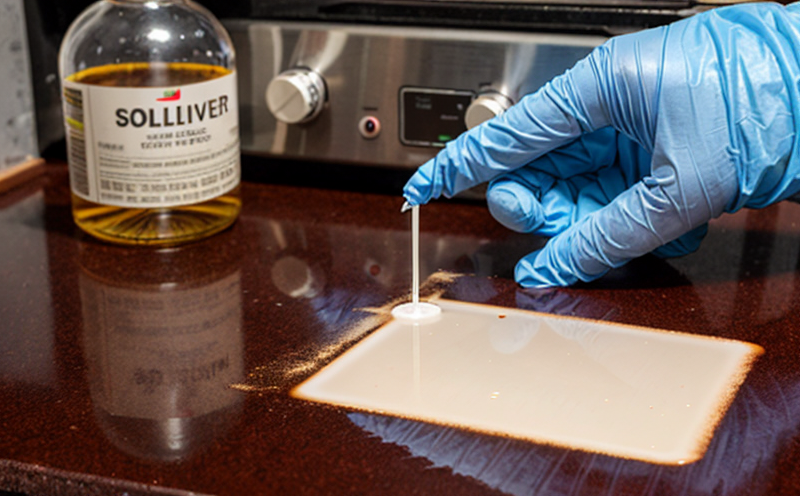Beer Solvent Residue Testing
In the world of brewing and beverage production, ensuring product purity is paramount. Beer solvent residue testing plays a crucial role in maintaining this integrity by identifying any unintended residues from solvents that may have come into contact with beer during storage, packaging, or transport processes. This service is essential for quality managers, compliance officers, R&D engineers, and procurement teams who are responsible for ensuring that the final product meets stringent safety and regulatory standards.
The presence of solvent residues in beer can lead to off-flavors, altered taste profiles, and potential health risks. It is therefore imperative for breweries to implement rigorous testing protocols to detect even trace amounts of solvents. This service involves a series of sophisticated analytical techniques that help identify the type and concentration of solvents present, ensuring that any detected residues are well below acceptable limits.
The process typically begins with sample preparation where the beer sample is processed in a way that does not alter its chemical composition. The prepared samples undergo chromatographic analysis using gas chromatography-mass spectrometry (GC-MS) which provides high sensitivity and specificity for identifying solvent compounds. This approach ensures accurate detection of even minute traces of solvents, making it an indispensable tool for breweries aiming to meet international standards.
Compliance with global regulations is critical in the beverage industry. The ISO 9001 and ASTM E1758 standards provide a framework for quality management systems that breweries must follow to ensure their processes are robust and effective. Additionally, adherence to local regulations such as those set by the European Union's (EU) ensures that all products are safe for consumption.
Implementing this testing service not only helps breweries meet regulatory requirements but also enhances their reputation by demonstrating a commitment to product safety and quality. By adhering to these standards, breweries can build trust with consumers while minimizing the risk of recalls or legal issues associated with contaminated products.
- Benefits: Ensures that the final product is free from harmful solvents.
- Risk Management: Identifies and mitigates risks early in the production process.
- Reputation: Enhances brand reputation by demonstrating adherence to high standards of quality and safety.
The importance of solvent residue testing cannot be overstated, especially given the complexity of modern brewing processes. By investing in this service, breweries can safeguard their operations from potential contamination while ensuring that they meet all necessary regulatory requirements. This proactive approach not only protects consumer health but also contributes to the overall sustainability and longevity of the business.
Why It Matters
The significance of solvent residue testing in beer cannot be overstated, particularly given the intricate nature of brewing processes that involve various stages from raw material procurement to final product distribution. Ensuring the absence of solvent residues is critical for maintaining the quality and safety of the end product.
During the production process, solvents such as ethanol or propanol are used in cleaning equipment, sterilization procedures, or even as part of the fermentation process itself. However, if not properly managed, these solvents can leave behind residues that contaminate the beer, affecting its flavor and potentially posing health risks to consumers. Identifying these residues early on through comprehensive testing is crucial for maintaining product integrity.
The use of advanced analytical techniques like GC-MS allows laboratories to detect even trace amounts of solvents, providing a reliable measure of compliance with international standards such as ISO 9001 and ASTM E1758. By adhering strictly to these guidelines, breweries can ensure that their products meet not only regulatory but also consumer expectations for purity and safety.
Moreover, solvent residue testing is essential in safeguarding the reputation of a brewery. In an era where transparency and accountability are key factors influencing consumer trust, demonstrating adherence to stringent quality control measures is vital. Failure to address even minor issues can lead to widespread distrust among customers, damaging brand image and potentially affecting sales.
In summary, solvent residue testing serves multiple purposes—ensuring product safety, maintaining compliance with industry standards, protecting against health risks, enhancing reputation management, and fostering consumer trust—all of which contribute significantly to the success and sustainability of a brewery. Investing in this service is therefore not just advisable but essential for any serious player in the beverage industry.
Applied Standards
The application of relevant standards ensures that beer solvent residue testing meets international quality and safety benchmarks. The primary standard used in this context is ISO 9001:2015, which provides a framework for effective quality management systems. This certification helps ensure that the testing process is efficient, consistent, and capable of meeting stringent requirements.
For analytical methods specifically aimed at detecting solvent residues, ASTM E1758-20 serves as a widely recognized guideline. This standard outlines procedures for the extraction and analysis of volatile organic compounds (VOCs) in beverages, including beer. By following these guidelines, laboratories can ensure that their testing methodologies are robust and reliable.
In addition to these international standards, breweries may also need to comply with local regulations such as those issued by the European Union (EU Solvent Guidelines). These guidelines emphasize the importance of minimizing solvent exposure during all stages of production, from raw material handling to finished product distribution. Compliance with these regulations not only ensures legal compliance but also reinforces a brewery's commitment to maintaining high standards of quality and safety.
Furthermore, breweries should consider certification through bodies like ASQ (American Society for Quality) or UKAS (United Kingdom Accreditation Service), which provide additional assurance of the laboratory's reliability and accuracy. These certifications underscore a brewery’s dedication to excellence in quality control, thereby building trust among consumers and stakeholders.
In summary, adhering to these standards not only ensures that solvent residue testing is conducted accurately but also reinforces a brewery’s commitment to maintaining high-quality products. By leveraging internationally recognized guidelines such as ISO 9001:2015 and ASTM E1758-20, alongside local regulations like EU Solvent Guidelines, breweries can ensure their processes are both efficient and compliant.





